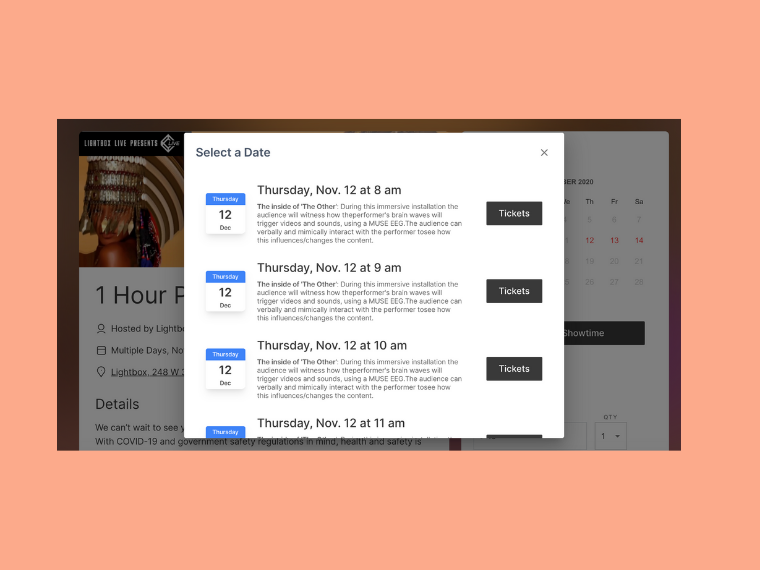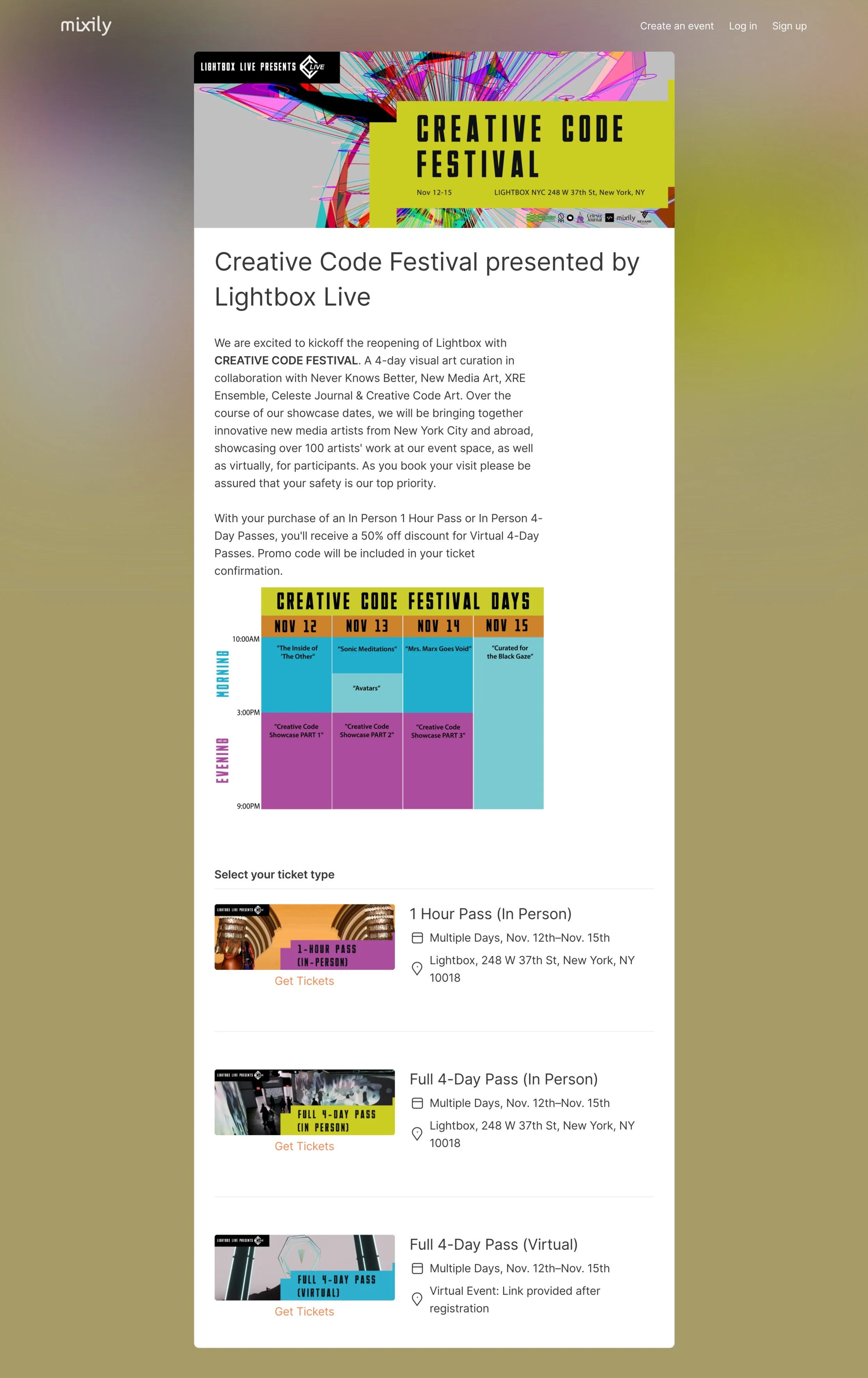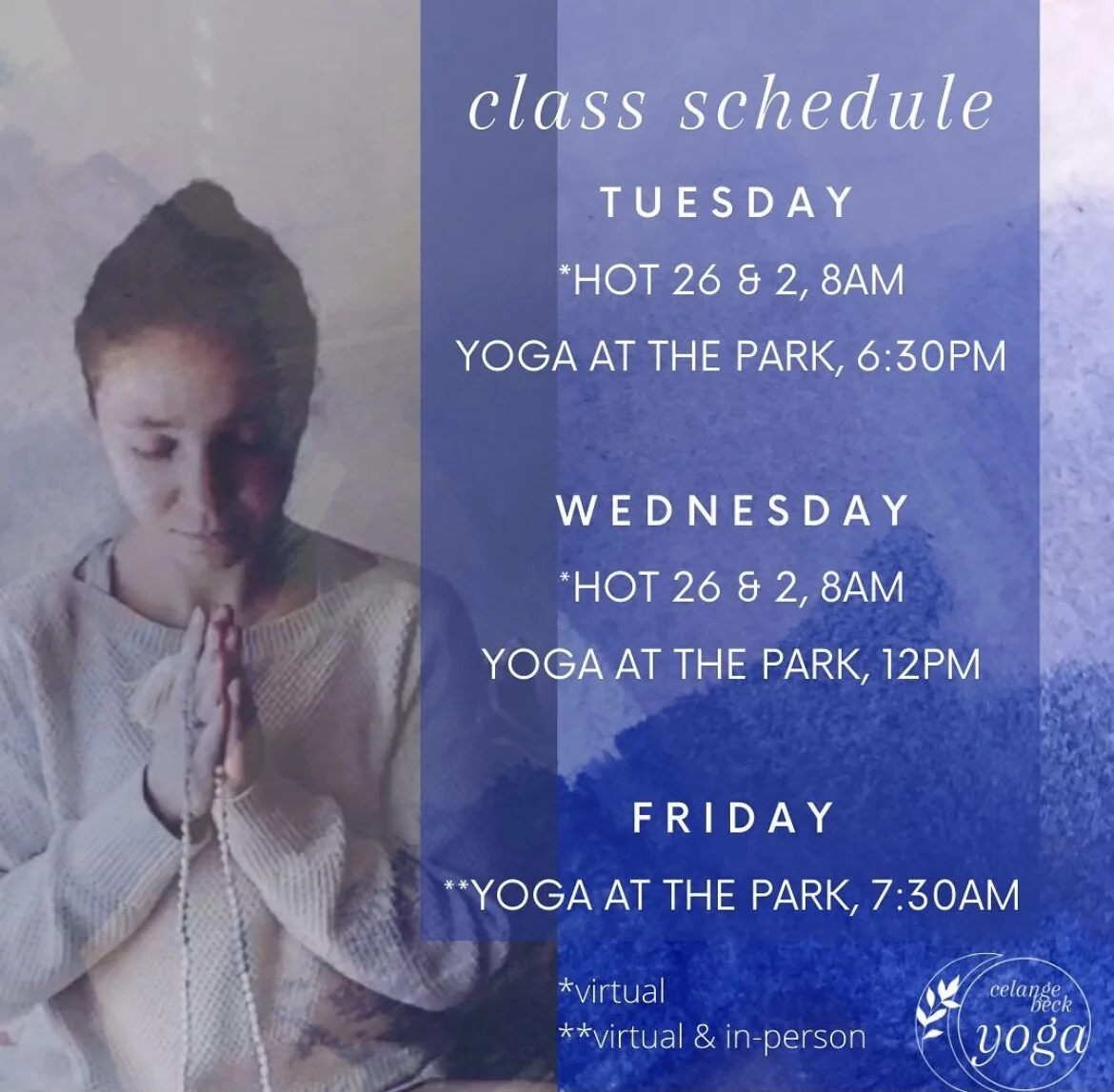Benefits of Hosting Hybrid Events
What is a hybrid event?
A hybrid event is a combination of a live in person experience with a virtual online element. 2020 has seen a boom of virtual events and they won’t be going away anytime soon. We’re also seeing creative ways of gathering in person, with outdoor dining, ticketed time slot experiences, drive-ins and new solutions created by clever event organizers paying attention to health and safety protocols. With Zoom fatigue and an eagerness to connect with others, we’re beginning to see more hybrid events, and predict there will be a rise of even more going into 2021.
5 benefits of hybrid events
1. Reach more people online - With the increase of virtual events, one huge benefit is that hosts can now reach new audiences across different cities and time zones. You no longer need a huge venue to hold your audience, you’re able to reach a larger audience by tapping into new communities online.
2. Design the full experience IRL and URL - Online, attendees may be distracted by things going on at home, but in person the organizer controls the full vibe from the sound, lighting, scent and program. It’s hard to beat the collective experience of in person events, especially when it comes to events focused on your senses, like food. Hybrid events allow organizers to continue their creativity in designing IRL experiences, for smaller groups. Plus, organizers get to design the online experience for virtual attendees with a focus on the content and special surprises.
3. Tiered ticketing options - With hybrid events, the in person ticket becomes a VIP pass and online is the general admission ticket. Hosts have the opportunity to offer a range of ticket prices to appeal to more people by tiering the in person and virtual tickets.
4. Opportunity to package content and resell after - When producing an in person event, after it’s over often the experience is only a memory for the attendees. While some conferences record talks and may upload after, there usually is not a plan on how to monetize content. If organizers create a strategy from the beginning of the virtual experience, they can develop a plan to continue selling access to the content beyond the duration of the event and tap into people’s FOMO who missed the live event.
5. Greater profit potential - By reaching new audiences with the virtual component organizers can increase overall capacity of their event, plus with the opportunity to resell content - there is now the potential to earn a higher profit than events that are constrained to in person.
The steps to plan hybrid events
When planning a hybrid event, hosts are in essence producing two events at the same time. There are a lot of factors to consider. Let’s break down a game plan.
1) What will the in person event be like?
Let’s start with the in person event. With Covid, you’ll need to research the safety protocols in your city. The attendance numbers may look very different than events you planned pre-2020. Consider ticketed time slots to control entry. Research the required security, cleaning and sanitation and staffing that you’ll need. Give your budget a good look and add extra costs for safety measures. Due to higher costs and less attendees, this will change your ticket prices and if you’re hosting a repeat event you’ll want to create a VIP experience so return guests feel they are getting an extra special experience. Look at what other organizers have done successfully, such as outdoor craft fairs or outdoor dining which limits tables to 1.5 hours. See what people in your city feel comfortable doing IRL and plan around that.
2) What will the virtual event be?
As you’ve working out the details for your in person event, now it’s time to think through what the virtual component will be. In some cases you might be able to livestream exactly what is being produced IRL. But how can you make it more engaging for the attendees at home? Is there a shopping list with supplies they can purchase in advance, a box that could be delivered, worksheets or exclusive access to content shared with virtual tickets? If the virtual experience is different than what is happening in person, you’ll need to produce the program of activities to keep your audience engaged. Remember that many people at home are experiencing Zoom fatigue, so design a fun virtual experience which will feel like an escape from the work day.
3) What is the ticketing and Livestream platform?
If you’re selling tickets to your hybrid event, you’ll want a ticketing platform that includes both in person and virtual passes. This way you can link to your ticketing page across newsletters, social media and press and send everyone to the same site. Attendee then can select their ticket based on how they want to enjoy the event. Beyond the virtual experience planning, you’ll also need to think of the virtual logistics like how you record the video, where to feed it to and where your attendees will access it. How will you control link sharing to prevent someone from purchasing a ticket and sending it to friends? Instead of sending your guests to a Zoom link or Youtube for the livestream, send them to your website. Create your own virtual venue on your website, so you can own the experience online in the same way you own your in person event.
Sell tickets online for hybrid events
Obviously there are a lot of details to planning a hybrid event, so hosts need a hybrid event platform that will make their work easier. That’s what we’re here to help with at Mixily. Right now we’re working with small businesses and independent creators to empower them with solutions for hybrid events.
We helped Lightbox, a venue in Manhattan sell tickets online for their hybrid event art festival. The festival is happening over 4 days at their venue with different artists showcasing their art across the morning and evening of each day. With them we created a ticketing solution and livestream site to make the event possible. They offer 3 different types of tickets, 1 hour passes, 4 day passes, and virtual passes. On Mixily we created three event pages and a branded listing page to group the ticket types together. Because of Covid regulations they can allow a max of 30 people in the venue per time slot, so the 1 hour and 4 day passes have maximum capacities. For everyone who purchases a virtual pass, they will receive a unique link to be able to access the event. This will prevent link sharing and support the artists.
Another example of a hybrid event is yoga with Celange Beck. Weekly on Fridays she hosts a yoga class both at a park in D.C. and also on Zoom. By opening the experience up, she’s able to reach yogis who want to practice with her both in person and those who feel more comfortable at home. She sets up a camera in the park and livestreams the exact same class she’s teaching in person, and effortlessly increases her profit.
With the boom of online event experiences, there are many new products popping up that are built solely for virtual events. At Mixily we’re talking with hosts and building your event hosting solution designed for both IRL, URL and hybrid events. Organizers had to quickly learn how to pivot to virtual experiences, and next we project a wave of hybrid events as a step back to the fully in person events we are used to. Even once they are back, we don’t see hybrid events going away any time soon.
If you’re interested in learning more about how Mixily supports hybrid events with our Virtual Venue and virtual event online event ticketing, get in touch at mixily.com.




